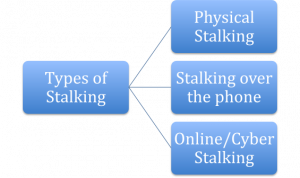[Trigger Warning: This explainer contains information on physical violence, sexual violence, abuse and slurs which some readers may find disturbing.]
If a person repeatedly follows, contacts or monitors someone despite their disinterest or lack of consent, it is known as stalking. Stalking is a term used for numerous activities done by a person, which when taken together can disrupt the life of the survivor.(( Section 354D, Indian Penal Code, 1860.)) Under the law, only a man can be punished for the crime.

Stalking can happen in close proximity physically or over the phone or even online. The crime of stalking is:
- Repetitive in nature and is consistent.(( State v. Sh. Abhimanyu, District Court, (Special Judge, CBI) Delhi (2018) CA No.18/15.))
For example, if a person sends love letters every day to someone, despite their disinterest.
For example, if flowers are repeatedly sent to a person’s office by someone and this makes them the subject of ridicule at the office.
- It is an invasion of personal space.
For example, if someone is followed every day to their place of work.
- Attempting to establish a relationship or personal contact with someone without their consent.
For example, if someone sends multiple WhatsApp messages hoping for a reply.
The punishment for online stalking is jail time up to three years along with a fine. For repeat offenders, the punishment is higher, i.e. up to five years jail time along with a fine.(( Section 354D, Indian Penal Code, 1860.))
[Trigger Warning: This explainer contains information on physical violence, sexual violence, abuse and slurs which some readers may find disturbing.]
It is a crime to physically stalk someone, i.e. someone tries to follow a person wherever they go and contact them even after they have expressed their disinterest. Under the law, only a man can be punished for the crime.(( Section 354D, Indian Penal Code, 1860.))
Some examples of physical stalking are:
- Waiting outside a person’s house every day, sending gifts and letters everyday despite a lack of interest.
- Following someone from their place of work(( Shri Deu Baju Bodake v. The State of Maharashtra, 2016 SCC Bom 15454; Arun Kumar Mishra v. State Crl. A. No. 1577/2014; Kalandi Charan Lenka v. State of Orissa BLAPL No.7596 of 2016.)) to the places they visit regularly.
- Repeated requests or demands for sexual favours or confessions of love.(( Shri Deu Baju Bodake v. The State of Maharashtra, 2016 SCC Bom 15454.))
The punishment for physical stalking is jail time up to three years along with a fine. For repeat offenders, the punishment is higher, i.e. up to five years jail time along with a fine.(( Section 354D, Indian Penal Code, 1860.))
[Trigger Warning: This explainer contains information on physical violence, sexual violence, abuse and slurs which some readers may find disturbing.]
If someone repeatedly contacts a person through calls or texts by the means of a telephone, then, it is a crime under the law. Under the law, only a man can be punished for the crime.(( Section 354D, Indian Penal Code, 1860.))
For example, sending someone messages on their phone begging to meet them or for sex despite a clear disinterest from their end.
The punishment for stalking over the phone is jail time up to three years along with a fine. For repeat offenders, the punishment is higher, i.e. up to five years jail time along with a fine.(( Section 354D, Indian Penal Code, 1860.))
[Trigger Warning: This explainer contains information on physical violence, sexual violence, abuse and slurs which some readers may find disturbing.]
If a person persistently monitors or follows a person’s activity on the internet through email, social networks and instant messaging applications such as WhatsApp etc. it is a crime of cyberstalking.
Some of the common forms of cyber stalking are(( Kalandi Charan Lenka v. State of Orissa BLAPL No.7596 of 2016.)):

- Persistent contact by someone on different modes of social media, for example, WhatsApp and Facebook.
- Using social media to get all personal information and pictures of someone to use it against them.
- Sending emails containing obscene images and videos, displaying nude or morphed pictures along with threats and abuses.
- Posting obscene/nude pictures of someone on the internet or on a pornographic website.
- Monitoring a person’s activity by accessing a computer’s webcam or a computer device.
The punishment for online stalking is jail time up to three years along with a fine. For repeat offenders, the punishment is higher, i.e. up to five years jail time along with a fine.(( Section 354D, Indian Penal Code, 1860.))

